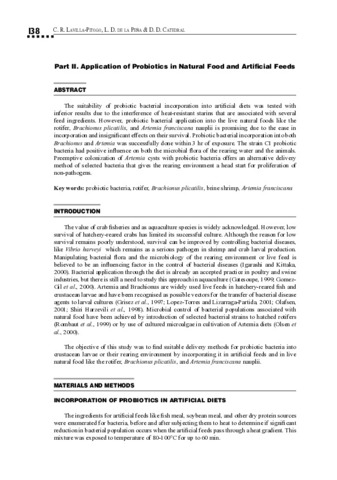Use of bacteria as biological control agent against microbial diseases in shrimp (Penaeus monodon) and crab (Scylla serrata) hatcheries: Part II. Application of probiotics in natural food and artificial feeds
- Global styles
- MLA
- Vancouver
- Elsevier - Harvard
- APA
- Help
Share
Abstract
The suitability of probiotic bacterial incorporation into artificial diets was tested with inferior results due to the interference of heat-resistant starins that are associated with several feed ingredients. However, probiotic bacterial application into the live natural foods like the rotifer, Brachionus plicatilis, and Artemia franciscana nauplii is promising due to the ease in incorporation and insignificant effects on their survival. Probiotic bacterial incorporation into both Brachionus and Artemia was successfully done within 3 hr of exposure. The strain C1 probiotic bacteria had positive influence on both the microbial flora of the rearing water and the animals. Preemptive colonization of Artemia cysts with probiotic bacteria offers an alternative delivery method of selected bacteria that gives the rearing environment a head start for proliferation of non-pathogens.
Suggested Citation
Lavilla-Pitogo, C. R., de la Peña, L. D., & Catedral, D. D. (2005). Use of bacteria as biological control agent against microbial diseases in shrimp (Penaeus monodon) and crab (Scylla serrata) hatcheries: Part II. Application of probiotics in natural food and artificial feeds. In K. Nagasawa (Ed.), Recent Advances in Diagnosis and Prevention of Fish and Shrimp Diseases in Southeast Asia (pp. 138–143). Tigbauan, Iloilo, Philippines: Aquaculture Department, Southeast Asian Fisheries Development Center.
Type
Book chapterISBN
9718511732


 AQD Access
AQD Access
